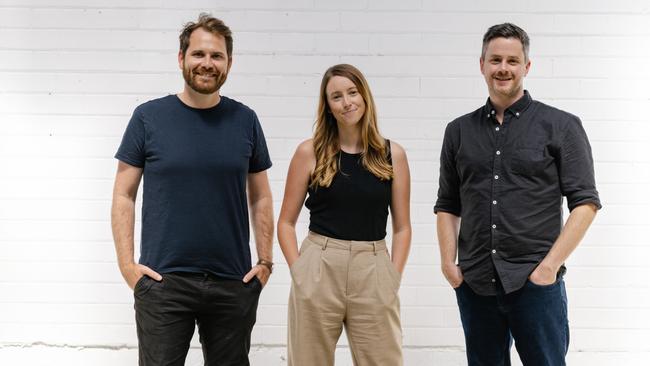Canva co-founder Cameron Adams and Blackbird back climate tech start-up Sumday
Venture capital giant Blackbird Ventures has led an investment round into Tasmanian fintech start-up Sumday, with billionaire Cameron Adams also backing the software company.

Venture capital giant Blackbird Ventures has led an investment round into Tasmanian fintech start-up Sumday, with billionaire Cameron Adams and partner Lisa Miller also backing the software company in one of their first public start-up investments.
Co-founded by executives who each have a self-described passion for climate action, Sumday’s product is an online platform for accountants to help them deliver carbon accounting services to their clients. Chief executive Jess Richmond said in an interview that Sumday was born out of a frustration around a lack of accuracy and transparency in carbon accounting.
“Very few organisations could tell you how their carbon emissions were calculated, or what impact their purchasing decisions have on their overall footprint, with any real degree of certainty,” Ms Richmond said.
“The data we need to do that largely does not exist and we’re here to change that.”
The start-up has raised $2m from Blackbird, Possible Ventures, Canva co-founder Cameron Adams and his partner Lisa Miller – a former Canva executive and the CEO of Wedgetail Ventures – to develop its software and accelerate global expansion. Its valuation was not disclosed.
Sumday is already used by accounting firms, including small practices up to those with a global network, Ms Richmond said, and its software operates on a subscription model, scaling with the size of the business.
“The transition from accounting firm to tech start-up has been a learning curve, but in many ways we were running our firm like a start-up,” Ms Richmond said.
“We were already using our profits to pay our full-time software developer to build internal platforms. In two years we grew the firm from two to nearly 20 and we didn’t have any outside investment, which forced us to be lean and fast in offering new services that would help us grow.”

The executive said that while a global carbon accounting framework has existed for more than 15 years, it’s only in the past year or so that there’s been widespread recognition that businesses need to be accounting for their impact, including carbon emissions.
“For accountants, carbon accounting is moving from these high-level instant calculations into their direct wheelhouse – transparent, accurate accounting for the purposes of informed decision making,” she said.
“The gap is really around education and access to quality data which is what Sumday is here to fill by empowering accountants to understand this evolving space. They can use our software to provide accounting support to every business, effectively building the world’s most reliable non-financial accounting database, for the benefit of everyone.
“We believe Sumday will change the way businesses around the world account for things that truly matter, in a way that is transparent, accurate and meaningful.”
Michael Tolo, who was recently appointed a partner at Blackbird Ventures, was the lead investor into the $2m funding round.
“In order to accelerate climate investment over the coming decades, we need a better approach to understand how, and precisely to what degree, these investments will reduce our emissions,” he said.
“We need the same rigour in carbon accounting as we demand across financial accounting as table stakes. Sumday is building the tools to make this accessible for every business.”
Now based in Tasmania, Canva co-founder Cameron Adams is an investor in a number of enviro-tech start-ups including biomaterial company Uluu, “stone paper” start-up Karst, renewables finance company Brighte, sustainable toilet paper-maker Who Gives A Crap, as well as sustainable investment and advisory firm Pollination.
The investment into Sumday is one of the first public investments from his new VC fund Wedgetail, run with partner Lisa Miller.
“Sumday have a true advantage in building a product that understands where carbon accounting is heading and who will be helping businesses grapple with the implications of it,” Mr Adams said.
“We were even more excited to learn that they’re thinking even further ahead to take natural capital accounting into account, which will be the next important wave in addressing the impact that we all have on biodiversity and the planet.”


To join the conversation, please log in. Don't have an account? Register
Join the conversation, you are commenting as Logout